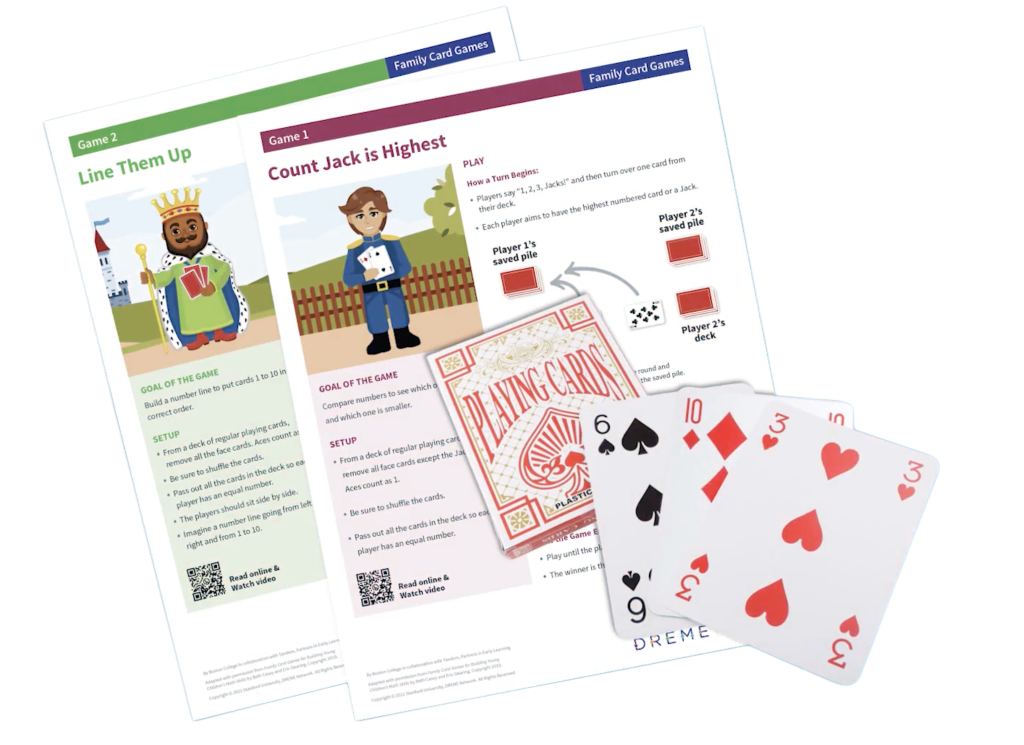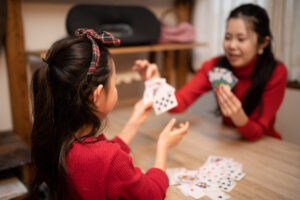How children feel about math affects their learning. Sadly, many children associate negative feelings with math. They may have had experiences that made them discouraged or they may have heard parents or siblings make negative comments about math. One way to help your child develop a more positive math attitude is to use DREME’s Family Math Kits to help children replace the “I’m just not good at math” narrative with a sense of curiosity, confidence, and joy and at the same time help them improve their math and executive functioning (EF skills).
What are EF Skills?
There are four major EF skills that learning math helps children develop. These include:
Inhibitory Control
The ability to control thoughts, emotions, behavior, and attention
Example: Waiting their turn in a game without interrupting.
Cognitive Flexibility
The ability to adapt to new situations
Example: Finding a new way to build a tower when a block doesn’t fit.
Goal-Directed Behavior
Actions taken with a specific end goal in mind or the processes that allow a child to plan their actions and behaviors to meet a goal
Example: Setting the table step by step before dinner.
Working Memory
The brain’s ability to temporarily hold the information needed to meet a goal
Example: Remembering the rules of a game while playing with friends.
Why Does Your Child’s Attitude Towards Math Matter?
Research shows that a child’s math knowledge serves as a predictor for future academic success, even in subjects that do not involve math. Children learn math and develop executive functions best when they have confidence in their ability to learn and when they enjoy doing math. For example, when children have positive attitudes towards math, they are more likely to persevere when they run into difficulty rather than give up. They are more likely to inhibit immediate impulse for solutions and try different strategies to solve a math problem. If they don’t like math or don’t believe they are good at it, they are likely to avoid it, feel frustrated and discouraged when they aren’t able to solve a problem quickly and stop trying.
DREME’S Family Math Kits are designed to help children develop these skills through fun, hands-on activities. They include activity and assembly instructions as well as the math journal. This journal shifts math attitudes by celebrating all the ways families are already doing math in their everyday lives. Through using the journal, children and families can see that they are math doers, making everybody feel better about math.
The more opportunities that children have to engage with math activities, the more they learn. Regardless, it is always important that they learn in a way that avoids negative feelings about math.
How Math Attitudes and EF Skills Intersect—and How DREME’s Family Math Kits Help
Keeping Calm

Positive math attitudes help children control their emotions such as frustration during challenging moments when they encounter a difficult problem or a new concept. By making math fun and laid-back, children will learn how to focus on a task while managing stress, developing their emotional self-regulation.
DREME’s Family Math Kits contains many activities designed to be playful, low-pressure, and implement children’s everyday lives. Take the Line Them Up game included in the Counting Math Kit as an example. Children use a deck of playing cards, an object that they already associate with playtime, to practice their counting skills—they can even play with other children! By creating a low-stakes, familiar, and joyful environment, students can develop their emotional self-regulation skills while practicing math.
Try, Try, Try Again

When you encourage children to approach math positively and calmly, they can see mistakes as learning opportunities instead of failures. One way to promote this is by reframing how you talk about math with your kids. If you make math seem like a fun puzzle or game, you can help shift your child’s mindset: the goal is not to get the right answer, but to engage in the math activity and have fun.
For example, the tangram puzzles from the Shapes and More Family Math Kit “gamifies” math. The puzzles encourage children to find different ways to fit pieces together by looking for shapes in everyday objects. The activity builds adaptability by giving children a chance to move shapes around and encourages a growth mindset – a belief that if you stick with the task, you’ll eventually solve it—and it develops your child’s cognitive flexibility.
Slow and Steady
It is important to remind your child that it is okay to take things step by step. A slow and steady approach to math problems encourages goal-directed behavior. Instill a sense of determination and perseverance in your child, making them more likely to see math problems that may look hard at first as solvable with some effort and patience.
Many of the activities featured in the Family Math Kits are multi-step. Breaking math down in this way encourages children to build towards an end goal.
Thinking it Through
Positive math experiences can strengthen a child’s ability to retain information and solve a problem. Talk through math problems and concepts with your child to motivate them to be aware of their thought process. For example, ask them how they figured out the solution?
Keeping up with the Family Math Journal featured in the Math kits supports both memory retention and encourages students to apply math concepts to their own lives, strengthening their working memory. Additionally, the “Talk Tips” featured in the kits promote math learning by having children engage in mathematical conversations with their families and peers.

Conclusion
DREME’S Family Math Kits are a gateway to building a child’s confidence, curiosity, and essential life skills. These kits transform everyday moments into opportunities to develop math and EF skills while creating a lifelong love of learning.
You can find the kits on DREME Family Math.



